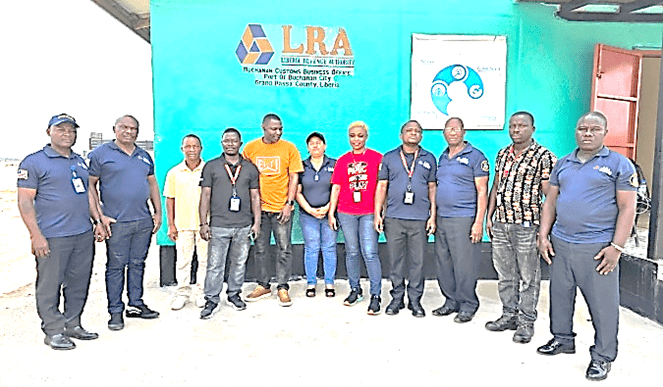The Liberia Revenue Authority (LRA) embarked on a capacity-building initiative for its customs officers stationed at the Port of Buchanan, signifying a crucial step in modernizing its operations and bolstering revenue collection efforts. A team from the LRA headquarters, representing Customs, Communications, and Taxpayer Education units, converged on Buchanan for a day-long knowledge-sharing session, focusing on emerging customs issues, ongoing automation processes, and updates on the ASYCUDA World system, the LRA’s core customs management platform. This initiative is strategically aligned with the LRA’s overarching objective of enhancing customs efficiency and effectiveness, particularly in light of the recent deployment of Starlink internet devices across its customs and tax offices nationwide, aimed at improving connectivity and operational fluidity.
The training sessions delved into critical aspects of customs operations, encompassing effective taxpayer engagement, particularly with importers and cross-border traders. Recognizing the importance of positive interactions between customs officers and taxpayers, the LRA prioritized training on communication and customer service skills. This emphasisunderscores the LRA’s commitment to facilitating smooth and transparent customs processes, promoting compliance, and ultimately maximizing domestic resource mobilization. By equipping officers with the necessary interpersonal skills, the LRA aims to cultivate a more conducive environment for trade and revenue generation.
The practical aspect of the training focused on the utilization of the LRA’s upgraded digital platforms for processing and collecting customs revenue. Under the guidance of ASYCUDA Functional Team Supervisor Bazzie Akoi, participants gained hands-on experience with the ASYCUDA World system, reinforcing their understanding of its functionalities and its role in streamlining customs procedures. This technological proficiency is crucial for optimizing revenue collection and ensuring accurate and timely processing of customs transactions. The integration of technology is a cornerstone of the LRA’s modernization strategy, designed to enhance transparency, reduce processing time, and minimize potential revenue leakages.
The strategic importance of these capacity-building initiatives was underscored by William Gegeh, Manager for Customs Modernization, who emphasized the direct correlation between enhanced skills and improved revenue performance. He proudly referenced the Customs Department’s unofficial surpassing of its revenue target in 2024, attributing this success, in part, to ongoing training and engagement efforts. Looking ahead, Mr. Gegeh affirmed the LRA’s commitment to replicating these training sessions across other Customs Business Offices nationwide, ensuring consistent skill development and operational uniformity throughout the department. This nationwide approach will further solidify the LRA’s capacity to achieve its ambitious revenue targets.
The LRA’s commitment to achieving a billion-dollar revenue collection milestone in the coming years underscores its ambitious goals and its unwavering focus on maximizing domestic resource mobilization. Mr. Gegeh’s call for continued diligence and commitment from customs staff, in alignment with the vision of Commissioner General James Dorbor Jallah and the LRA senior management, underscores the collective effort required to achieve this ambitious target. This shared vision emphasizes the vital role of every customs officer in contributing to the nation’s economic growth and development through efficient and effective revenue collection.
The LRA’s focus on workforce empowerment and operational modernization is not merely a strategic objective but a fundamental pillar of its mandate to drive domestic resource mobilization and national development. By investing in its human capital and embracing technological advancements, the LRA is laying the foundation for sustainable revenue growth and contributing significantly to Liberia’s economic progress. This commitment to continuous improvement and adaptation is crucial for navigating the evolving complexities of international trade and ensuring the LRA’s effectiveness in fulfilling its critical role in nation-building. The ongoing training and modernization efforts signal a proactive and forward-thinking approach, positioning the LRA to meet future challenges and opportunities in the realm of revenue collection and customs management.


